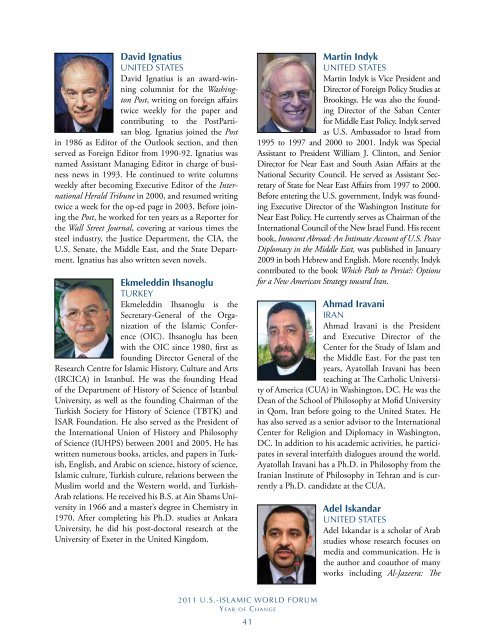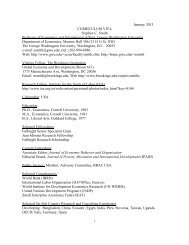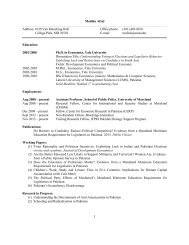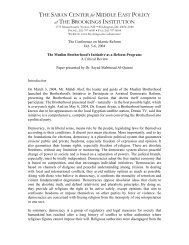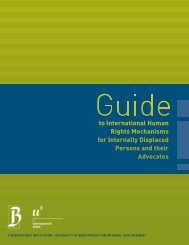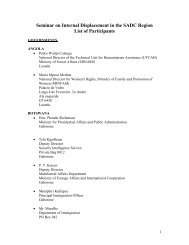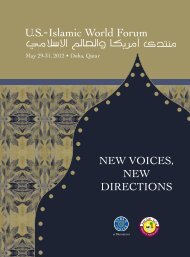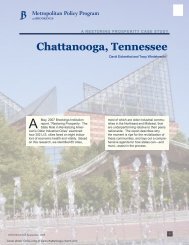Forum Agenda and Participant Biographies - Brookings Institution
Forum Agenda and Participant Biographies - Brookings Institution
Forum Agenda and Participant Biographies - Brookings Institution
Create successful ePaper yourself
Turn your PDF publications into a flip-book with our unique Google optimized e-Paper software.
david Ignatius<br />
UnIted StateS<br />
David Ignatius is an award-winning<br />
columnist for the Washington<br />
Post, writing on foreign affairs<br />
twice weekly for the paper <strong>and</strong><br />
contributing to the PostPartisan<br />
blog. Ignatius joined the Post<br />
in 1986 as Editor of the Outlook section, <strong>and</strong> then<br />
served as Foreign Editor from 1990-92. Ignatius was<br />
named Assistant Managing Editor in charge of business<br />
news in 1993. He continued to write columns<br />
weekly after becoming Executive Editor of the International<br />
Herald Tribune in 2000, <strong>and</strong> resumed writing<br />
twice a week for the op-ed page in 2003. Before joining<br />
the Post, he worked for ten years as a Reporter for<br />
the Wall Street Journal, covering at various times the<br />
steel industry, the Justice Department, the CIA, the<br />
U.S. Senate, the Middle East, <strong>and</strong> the State Department.<br />
Ignatius has also written seven novels.<br />
Ekmeleddin Ihsanoglu<br />
tURkey<br />
Ekmeleddin Ihsanoglu is the<br />
Secretary-General of the Organization<br />
of the Islamic Conference<br />
(OIC). Ihsanoglu has been<br />
with the OIC since 1980, first as<br />
founding Director General of the<br />
Research Centre for Islamic History, Culture <strong>and</strong> Arts<br />
(IRCICA) in Istanbul. He was the founding Head<br />
of the Department of History of Science of Istanbul<br />
University, as well as the founding Chairman of the<br />
Turkish Society for History of Science (TBTK) <strong>and</strong><br />
ISAR Foundation. He also served as the President of<br />
the International Union of History <strong>and</strong> Philosophy<br />
of Science (IUHPS) between 2001 <strong>and</strong> 2005. He has<br />
written numerous books, articles, <strong>and</strong> papers in Turkish,<br />
English, <strong>and</strong> Arabic on science, history of science,<br />
Islamic culture, Turkish culture, relations between the<br />
Muslim world <strong>and</strong> the Western world, <strong>and</strong> Turkish-<br />
Arab relations. He received his B.S. at Ain Shams University<br />
in 1966 <strong>and</strong> a master’s degree in Chemistry in<br />
1970. After completing his Ph.D. studies at Ankara<br />
University, he did his post-doctoral research at the<br />
University of Exeter in the United Kingdom.<br />
2011 U.S.-ISLAMIC WORLD FORUM<br />
Y e A R OF ChAnge<br />
41<br />
Martin Indyk<br />
UnIted StateS<br />
Martin Indyk is Vice President <strong>and</strong><br />
Director of Foreign Policy Studies at<br />
<strong>Brookings</strong>. He was also the founding<br />
Director of the Saban Center<br />
for Middle East Policy. Indyk served<br />
as U.S. Ambassador to Israel from<br />
1995 to 1997 <strong>and</strong> 2000 to 2001. Indyk was Special<br />
Assistant to President William J. Clinton, <strong>and</strong> Senior<br />
Director for Near East <strong>and</strong> South Asian Affairs at the<br />
National Security Council. He served as Assistant Secretary<br />
of State for Near East Affairs from 1997 to 2000.<br />
Before entering the U.S. government, Indyk was founding<br />
Executive Director of the Washington Institute for<br />
Near East Policy. He currently serves as Chairman of the<br />
International Council of the New Israel Fund. His recent<br />
book, Innocent Abroad: An Intimate Account of U.S. Peace<br />
Diplomacy in the Middle East, was published in January<br />
2009 in both Hebrew <strong>and</strong> English. More recently, Indyk<br />
contributed to the book Which Path to Persia?: Options<br />
for a New American Strategy toward Iran.<br />
ahmad Iravani<br />
IRan<br />
Ahmad Iravani is the President<br />
<strong>and</strong> Executive Director of the<br />
Center for the Study of Islam <strong>and</strong><br />
the Middle East. For the past ten<br />
years, Ayatollah Iravani has been<br />
teaching at The Catholic University<br />
of America (CUA) in Washington, DC. He was the<br />
Dean of the School of Philosophy at Mofid University<br />
in Qom, Iran before going to the United States. He<br />
has also served as a senior advisor to the International<br />
Center for Religion <strong>and</strong> Diplomacy in Washington,<br />
DC. In addition to his academic activities, he participates<br />
in several interfaith dialogues around the world.<br />
Ayatollah Iravani has a Ph.D. in Philosophy from the<br />
Iranian Institute of Philosophy in Tehran <strong>and</strong> is currently<br />
a Ph.D. c<strong>and</strong>idate at the CUA.<br />
adel Isk<strong>and</strong>ar<br />
UnIted StateS<br />
Adel Isk<strong>and</strong>ar is a scholar of Arab<br />
studies whose research focuses on<br />
media <strong>and</strong> communication. He is<br />
the author <strong>and</strong> coauthor of many<br />
works including Al-Jazeera: The


